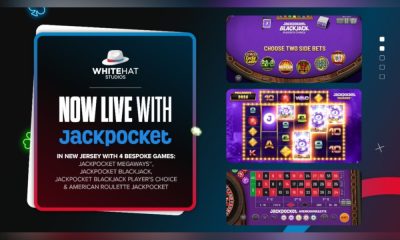Industry News
Blackjack History and Specific Features of the Game

Blackjack commands the most massive following of all table games in both online and offline gambling platforms. The game’s fame is rooted in having been around for a long time and also its depiction in pop culture creations such as films, TV shows, and even literature pieces. Blackjack is a card comparing game that pits one or several gamers against a croupier, and each one gets their turn to try and beat the house. Blackjack has a rich history that has helped build it up to the well-respected game. Also, numerous blackjack strategy approaches have come up over the years to draw the attention of a bigger fan base.
The Beginning
Blackjack roots can be traced back to the early eighteenth century. Like most games that have been around long, the origins of blackjack are muddled and are still the subject of argument to date. Even so, it is agreed that the indulgent didn’t come to be from the actions of a single person or a particular point in time. Instead, it is the result of gambling evolution that continues to this date, especially with the entry of online casinos. The revolution of blackjack to what it is today took different roots in history, and some of the most popular theories include:
- French casinos: The most common belief of blackjack origins is that the game has its roots in French casinos. The game popped up in the country’s gambling establishments in the early 1700s as Vingt-et-Un, which translates to 21. This game is believed to have been a variation of other popular card games at the time that dominated the gambling scene such as Chemin de Fer.
- Spanish roots: Spaniards have also been linked to the game of blackjack. During the eighteenth century, Spanish casinos offered a similar version of what is played today dubbed Trente-Un, which translates to 31. In the game, players had to gain a card value of thirty-one using only three cards before the dealer did. This is ten cards more than what is used today.
- Rome casinos: It is no secret that ancient Rome was home to thriving gambling habits among its citizens, especially soldiers. It is believed that the Romans played the game with wooden planks in the place of cards with each block holding a different numerical value. However, there is no evidence of the link between this game and modern blackjack, but the Romans love for gambling makes it a popular theory nonetheless.
The American Twist
Out of the three games believed to have inspired the game, the French version is the one that gained the most popularity and spread around the world. The set was well-accepted in North America where it was introduced during the French revolution by colonists. The game still held on to some traditional rules, including the limitation that only the croupier was allowed to double. Also, a betting round was played before the next playing card was dealt. The game still went by the name twenty-one when it reached Nevada in the early twentieth century, which was around the time that casinos were made legal.
With the gambling sector scrambling to get as much attention with its newfound legality, some rule changes were made. On top of the usual stakes, players were allowed to gamble on a special bet. In the hand, players would win if it contained once of the two black jacks used in the deck – the jack of clubs or that of spades. On top of that, the Ace of Spades had an odds upgrade where it would pay ten to one. As the game gained more popularity, gambling destinations soon dropped these special stakes, but the name blackjack stuck from the peculiar bet that made it famous. Today, the value of the Ace of Spades is juggled depending on the dealt hand.
Blackjack Gameplay and Features
Over the years, numerous variations of blackjack have cropped up in a bid to keep the popularity of the game alive. Even so, all versions of the game are similar to the classic version with only a few twists in the rules that act as building blocks for slightly different gameplay experience. In blackjack and all its variations, the gameplay procedure remains constant. Players need to have a card value of 21 or one close to it before the dealer. If the number goes over 21, whoever holds it busts and automatically loses the round. Also, if the card value is lower than that of the dealer’s, then the player loses. Each card contributes a different value to the hand as follows:
- The numbered cards award face value. For instance, a 3 card counts as three and a 10 card counts as ten.
- The face cards, which are the kings, queens, and jacks, all award ten.
- The Ace counts as one or eleven. The considered value varies depending on which card would be most valuable to the hand. For instance, the eleven-card used in a hand valued at ten or less is handy but would bust if it is higher.
Now with the most basic rule down, here is a look at how a round of blackjack goes down:
The Purchase of Chips
This is necessary for brick and mortar casinos since real money is not used at the tables. In online and live gambling dens, however, the player’s balance is automatically changed to virtual chips once the game is launched.
Wager Placement
Blackjack round only begin once the player has placed their stake in the betting circle. Depending on the gaming club, the ring could be the casino logo or that of the game. The stakes are determined the chips used with each one being matched to a credit or cash value. The minimum stake also varies from one set to another. Online blackjack variations accommodate bets as little as a couple of pennies while land-based versions rarely go below five dollars.
Dealing of Cards
Blackjack is either conducted by a croupier in location-based and live casinos while an RNG serves the purpose in online versions. One card is handed out to the player face up while the dealer takes one face down. Another card is handed to the gambler face up, and the dealer receives one face-up as well. The dealing of cards marks the real beginning of the game.
Playing the Hand
From the two cards handed out, players have to add the values, which adds up to a value between 4 and 21. If the cards are an Ace of Spades and a ten-card, the round automatically ends with the player as the winner unless the dealer also has 21. In that case, no win is granted, but the original stake is not lost. If the value is not a blackjack, there are several ways that the gambler can proceed, and they include:
| Stand | If the first two cards are of an acceptable value, this move will end the round and require the dealer to reveal their cards. |
| Hit | If there is adequate room to improve the card total, the croupier will deal more cards until one chooses to stand or busts by going over 21. |
| Double down | If the card value is advantageous, one can choose to double their wager and receive an additional card. The added bet allows one to take or turn down the card after seeing its value. |
| Split | If the first two cards are of the same value, one can choose to separate them and have different stakes for each. Therefore, the gambler will be playing two hands that begin with an equal card value. |
| Surrender | If the first two cards are not of suitable value, players can choose to return the cards but at the loss of half their bet. |
In Brief
Blackjack is a continually evolving game with variations popping up now and then to challenge the norm. Players can access the game and its various versions online and offline in a wide variety.
AI
Despite AI’s Rise, Fraud Teams Keep Growing — SEON 2026 Report

SEON, the command centre for immediate Fraud Prevention and AML Compliance, has unveiled AI Reality Check: 2026 Fraud & AML Leaders Report, the second iteration of its sector research, derived from a worldwide survey of 1,010 leaders in fraud, risk, and compliance spanning payments, fintech, financial services, retail, eCommerce, and gaming.
The figures reveal an unforeseen narrative: AI is ubiquitous, yet operations are not becoming easier to manage. Currently, 98% of organizations utilize AI in fraud and AML processes, with 95% expressing confidence in its effectiveness; meanwhile, headcount plans rose from 88% to 94% year-over-year, and 83% anticipate budget increases in 2026.
Complexity Is Surpassing Automation
AI has not lessened the workload — it has revealed the extent of work that has always existed. Fraud losses are increasingly approaching revenue growth, threats are advancing more rapidly, and disjointed systems restrict the true potential of AI at scale. Key year-over-year shift:
Leadership’s confidence in their teams’ performance is lagging. The number of leaders who disagreed with the statement, “fraud losses are growing faster than revenue,” dropped by almost 40% from the previous year
Inside the Numbers:
AI is baseline, not experimental
- 98% already integrate AI into daily workflows (only 2% still planning)
- 95% are confident AI can detect and prevent fraud (52% very confident)
- Top use case: AI/ML for transaction monitoring (30%)
Fraud and AML investment keeps climbing
- 83% expect fraud/AML budgets to increase in 2026
- 94% plan to add at least one full-time hire (up from 88% in 2025)
- 85% plan to add a vendor, 49% plan to replace one
Fragmentation is the bottleneck
- 95% claim “some integration” between fraud and AML systems
- Only 47% run fully integrated workflows; the rest rely on partial connections
- 80% say getting a unified view of data is challenging
For many, time-to-value remains slow
Only 10% go live in under two weeks
38% take 1–3 months, 24% take 4+ months
When implementations run long, top impacts include increased costs (52%) and prolonged fraud exposure (47%)
Teams are growing, not shrinking
94% plan to increase headcount despite automation gains
85% see AI agents as support/augmentation, not replacement (only 12% see eventual replacement)
Top fraud threats reported:
- Account takeovers: 26%
- Promo/discount abuse: 18%
- Return fraud: 18%
“Fraud and financial crime were supposed to become more manageable as AI matured,” said Tamas Kadar, CEO and co-founder, SEON. “Instead, 2026 is the year leaders are confronting a more complicated reality. AI adoption is real, confidence is high, but the scale and pace of fraud — compounded by fragmented systems — continue to drive increased investment rather than reduced overhead. The bottleneck is no longer whether AI works. It’s everything around it: disconnected data, siloed teams, slow implementations. The organisations that pull ahead will be the ones that unify fraud and AML intelligence, shorten the distance between threats and controls, and treat integration as strategy, not plumbing.”
Fast-Growing Companies Invest in Integration Early
Organisations growing 51%+ are nearly twice as likely as slower peers to report that achieving unified visibility is “not very challenging.” They treat integration as infrastructure, not an IT project.
What’s Next: From “Does AI Work?” to “Can We Trust It?”
With adoption near-universal, the conversation is shifting to governance, explainability and accountability:
- 78% say decentralised digital identity will become central to fraud/AML
- 33% cite data privacy regulations (GDPR, CCPA) as the biggest external force shaping AML
- 25% point to criminals’ advancing use of AI and obfuscation techniques
The post Despite AI’s Rise, Fraud Teams Keep Growing — SEON 2026 Report appeared first on Eastern European Gaming | Global iGaming & Tech Intelligence Hub.
Ashley McCulloch Vice President North America at Evoplay
Evoplay Names Ashley McCulloch Vice President North America

Evoplay, the acclaimed game development studio, has named Ashley McCulloch as Vice President North America, strengthening its strategic emphasis on growth throughout the US and Canada.
McCulloch has over 15 years of experience that includes land-based, VLT, and online gaming. She has occupied high-level commercial positions at IGT and Light & Wonder and most recently worked as Director of Account Management North America at Inspired Gaming Group, where she led strategic account development and assisted with new market entry projects.
In addition to her commercial success, McCulloch serves as a board member for Women in Sports and Events, is part of Global Gaming Women, and was recognized in the 2024 Emerging Leaders in Gaming 40 Under 40, highlighting her influence in the industry.
At Evoplay, McCulloch will lead partnerships, regulatory licensing, product launches, and broader business development efforts as the provider speeds up its growth in the North American market.
Evoplay has secured a significant presence in the area, launching in Ontario via collaborations with prominent operators in the province, such as BetMGM and Caesars Entertainment.
In November 2025, Evoplay made a notable initial move into the United States by joining the lottery sector in Washington DC, establishing a connection to the US online gaming landscape.
With McCulloch’s hiring, the company aims to leverage this momentum and continue its expansion throughout regulated US states.
Ivan Kravchuk, CEO at Evoplay, said: “North America represents one of the most exciting growth opportunities for Evoplay, and Ashley McCulloch’s appointment is a major step forward in realising our ambitions in the region.
“Her extensive experience across land-based and online gaming, combined with her track record in commercial strategy, makes her the ideal person to lead our efforts as we scale.”
Ashley McCulloch, Vice President North America at Evoplay, added: “I’m very excited to be joining the Evoplay team at such a pivotal moment in its growth journey.
“The studio has built a strong reputation for high-quality content, and I look forward to developing partnerships and driving sustainable growth across North America.”
The post Evoplay Names Ashley McCulloch Vice President North America appeared first on Eastern European Gaming | Global iGaming & Tech Intelligence Hub.
Africa
VeliGames Secures SiGMA Africa’s Industry Rising Star Award

VeliGames, a game aggregation platform from VeliTech, has received the Industry Rising Star award at the SiGMA Africa 2026 Awards, highlighting the platform’s swift innovation and significant influence on African iGaming.
The Industry Rising Star award highlights a developing company that displays remarkable potential, creativity, and influence, rapidly positioning itself as a forthcoming leader in the iGaming sector. It emphasizes VeliGames’ dedication to providing not just a content pipeline, but also genuine innovation and a comprehensive growth engine for operators in developing markets.
“Winning the SiGMA Africa Award for Industry Rising Star 2026 is a proud moment for our team. From day one, we built VeliGames with African operators in mind, combining local-fit content, practical tooling, and pricing that makes sense on the ground. We back it all up with hands-on operational know-how from working in the region. That’s what being a true content partner looks like.” Irakli Kakhidze, CEO at VeliGames.
Tailored for Africa’s infrastructure challenges, device characteristics, and user habits, VeliGames provides a performance-oriented casino content layer aimed at thriving in areas where conventional, high-bandwidth aggregation methods struggle. Rather than solely competing based on catalogue size, VeliGames prioritizes the key factors that genuinely contribute to casino success in Africa: speed, accessibility, conversion, and session stability.
The platform delivers content in a highly efficient, mobile-centric setting designed to function dependably amid variable connectivity, restricted device storage, and brief gaming sessions, assisting operators in ensuring seamless gameplay and enhanced player experiences on a larger scale.
Alongside curated third-party titles, the platform includes exclusive in-house content:
- VeliPlay: bold, crash-and-fast titles built for immersion, retention, and high replay value
- Heaven of 7: high-impact slot content designed for strong engagement, session after session
Visit VeliTech at Stand 096 from March 3-5 to learn why VeliGames was honored as the Industry Rising Star. Discover live game demonstrations, witness performance features in action, and learn how operators can create unique iGaming brands with a platform designed for regional requirements.
The post VeliGames Secures SiGMA Africa’s Industry Rising Star Award appeared first on Eastern European Gaming | Global iGaming & Tech Intelligence Hub.
-

 Comatel6 days ago
Comatel6 days agoCOMATEL CELEBRARÁ UNA FIESTA PARA CIENTOS DE OPERADORES TRAS FINALIZAR EL PRIMER DÍA DE LA FERIA ESPAÑOLA, INTERAZAR
-

 Fotini Matthaiou7 days ago
Fotini Matthaiou7 days agoOctavian Gaming Titles Go Live with Novibet in Mexico
-

 Compliance Updates7 days ago
Compliance Updates7 days agoSpillemyndigheden: New Guidance on Responsible Gambling
-

 Amusnet7 days ago
Amusnet7 days agoAmusnet Introduces its “Jackpot Cards Plus” Island at Casino Adjara
-

 Fast Track7 days ago
Fast Track7 days agoFast Track Spark Lands in São Paulo for Advanced Retention Workshop
-

 Betting and Gaming Council7 days ago
Betting and Gaming Council7 days agoBGC: Government Tax Hike Boost for Black Market
-

 Canada4 days ago
Canada4 days agoPointsBet Canada to Contest Proposed 5-Day Suspension by AGCO
-

 Africa3 days ago
Africa3 days agoEGT showcases African growth strategy at SiGMA Africa 2026





























